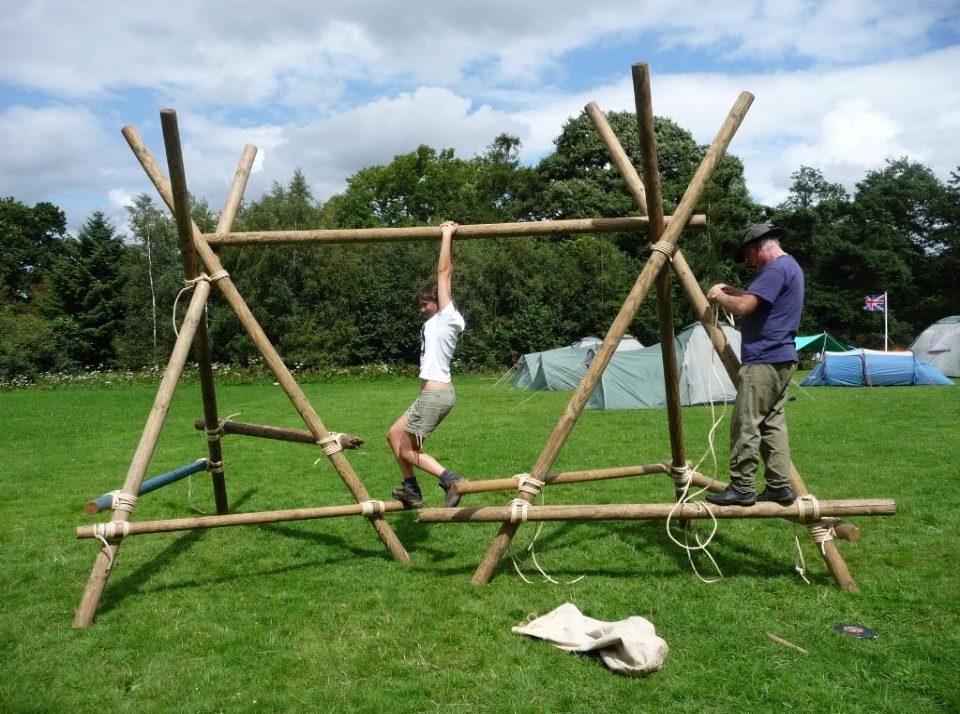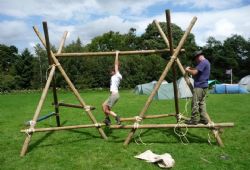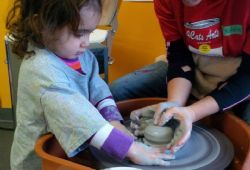During
Montreal’s short summer months, swimming pools, parks and movie theatres are
filled with young kids and teens, many of them attending summer camps. Not all
summer camps are about racing, swimming, water-gun fighting or junk-food
eating, but they are nonetheless valuable to kids in many different ways.
Summer camps are vital to children,
at least according to Cassandra Rose, the Director of the Tamaracouta Scout
Reserve, especially because in this day in age, kids are so devoted to their
computers, phones and tablets.
“The ability to interact on a
personal level, have the natural ‘screen saver’, (stars, wind in the leaves on
the trees, water running over rocks or lapping at the shores) at their
fingertips, having their senses bombarded with various sensations is an
essential part of growing up,” Rose said. “We are looking at […] youth that are
unable to interact with their fellow human beings without a piece of technology
between those interactions. Summer camps help to remove the technology, help to
encourage personal interactions, personal development, skill development,
personal empowerment, and an appreciation of personal leadership and skill
sets.”
As Rose pointed out, the camp also
is beneficial to kids because “it is the first step to going off on [their]
own.”
“It teaches you to be able to live
with other people,” she added. “Sometimes your best friend is not someone that
you can ‘live’ with (you may be messy
and them a ‘neat freak’), though you can still be best friends. Sometimes you learn about yourself, who you
are, and what your strengths are, without the parental influence… nobody knows
you, you are who you want to be for that period of time, and everyone respects
you for who you are… not who you ‘should’ be.”
According to Natalie Morin, the owner of the 4Cats
art studio in Vimont, camps that specify in certain things, like art, are a
good way to get the kids to develop that skill during the summer months.
“I think camps are important because
they keep them active,” she said. “If they have special interests, they can
focus on exploring those interests during the summer. If they have interests in
doing these things or learning a new instrument or learning how to paint, to
draw, this is a chance for them to do it. So it strengthens their skills or
develops news skills.”
Avelino Morais, owner of the
Montreal Robotics Camp, agreed. “The kids are learning to program [in Robotics
camp],” he said. “They’re improving their LEGO building skills or their
constructive skills in a sense that once they’ve built a model out of LEGO,
they have to make it move a certain way, autonomously… this eventually will
lead to real coding and programming that perhaps they might be interested in
when they get into the high school level.”
Like Rose, Morin and Morais believe
that summer camps give kids the chance to interact with one another.
“They also have the opportunity for
socialization, to make new friends outside of their usual school friends or
neighbourhood friends,” Morin said. “It fosters their independence, they learn
how to do things on their own, without their parents or their teachers around.”
“We’d like to think that by the end
of the week, they made new friends in the classroom,” Morais said. “They’re
always interacting in the class, and perhaps learning from each other or
talking with each other and in the end they hopefully come out with a few
friends that they will communicate with beyond summer camp.”
In the end, for Rose, summer camps
are important because the kids can learn a lot about themselves.
“They
learn about their potential, their limits and how far they are willing to go,”
Rose said. “They learn that even someone they may not like or get along with
has skills that will help them get through something. They learn about other
people, how to live with them, how to work together, and how to share their
skills for the sake of the ‘team.’"

 In The Latest Issue:Latest Issue:
In The Latest Issue:Latest Issue:
- A Bittersweet Farewell
- The new Laval Aquatic Co...
- The End of an Era:
Articles
Calendar
Virtual- ANNUAL TEACHER APPRECIATION CONTEST
- APPUI LAVAL
- ARTS & CULTURE
- CAMPS
- CAR GUIDE
- CCIL
- CENTENNIAL ACADEMY
- CHARITY FUNDRAISING
- CITYTV
- COSMODÔME
- COMMUNITY CONNECTIONS
- COVER STORY
- DINA DIMITRATOS
- ÉCOLE SUPÉRIEURE DE BALLET DU QUÉBEC
- EDITORIALS
- ÉDUCALOI
- EDUCATION
- EMPLOYMENT & ENTREPRENEURSHIP
- FÊTE DE LA FAMILLE
- FÊTE DU QUARTIER SAINT-BRUNO
- FAMILIES
- FESTIVAL LAVAL LAUGHS
- FÊTE DE QUARTIER VAL-DES-BRISES
- FINANCES
- GLI CUMBARE
- GROUPE RENO-EXPERT
- HEALTH & WELL-BEING
- 30 MINUTE HIT
- ANXIETY
- CHILDREN`S HEALTH & WELLNESS
- CLOSE AID
- DENTAL WELLNESS
- EXTREME EVOLUTION SPORTS CENTRE
- FONDATION CITÉ DE LA SANTÉ
- GENERAL
- HEARING HEALTH
- MESSAGES FROM THE HEALTH AGENCY OF CANADA
- MENTAL HEALTH
- SEXUALITY
- SOCIAL INTEGRATION
- SPECIAL NEEDS
- TEENS
- THE NUTRITION CORNER
- THE NUTRITION CORNER - RECIPES
- VACATION DESTINATION
- WOMEN'S FITNESS
- WOMEN'S HEALTH
- HILTON MONTREAL/LAVAL
- HOME & GARDEN
- INTERNATIONAL WOMEN'S DAY
- JAGUAR LAVAL
- LAVAL À VÉLO
- LAVAL FAMILIES TV SHOW
- LAVAL FAMILIES MAGAZINE CARES
- LAVAL URBAN IN NATURE
- LE PARCOURS DES HÉROS
- LES PETITS GOURMETS DANS MA COUR
- LEON'S FURNITURE
- LEONARDO DA VINCI CENTRE
- LFM PREMIERES
- LIFE BALANCE
- M.P. PROFILE
- MISS EDGAR'S AND MISS CRAMP'S SCHOOL
- MISSING CHILDREN'S NETWORK
- NETFOLIE
- NORTH STAR ACADEMY LAVAL
- OUTFRONT MEDIA
- PASSION SOCCER
- PARC DE LA RIVIÈRE-DES-MILLE-ÎLES
- PÂTISSERIE ST-MARTIN
- PIZZERIA LÌOLÀ
- PLACE BELL
- PORTRAITS OF YOUR MNA'S
- ROCKET DE LAVAL
- SACRED HEART SCHOOL
- SCOTIA BANK
- SHERATON LAVAL HOTEL
- SOCIÉTÉ ALZHEIMER LAVAL
- STATION 55
- STL
- SUBARU DE LAVAL
- TECHNOLOGY
- TEDXLAVAL
- TODAY`S LAURENTIANS AND LANAUDIÈRE
- TODAY`S LAVAL
- WARNER MUSIC
- THIS ISSUE
- MOST RECENT
Magazine
Summer Camps: a valuable experience beyond summer fun
Articles ~e 105,7 Rythme FM 4 chemins Annual Teacher Appreciation Contest Appui Laval Arts & Culture Ballet Eddy Toussaint Camps THIS ISSUE MORE...
CONTESTS Enter our contests
CONTESTS Enter our contests
CALENDAR
Events & Activities
COMMUNITY Posts Events
PUBLICATIONS Our Magazine Family Resource Directory
LFM BUSINESS NETWORK Learn more
COUPONS Click to save!
COMMUNITY Posts Events
PUBLICATIONS Our Magazine Family Resource Directory
LFM BUSINESS NETWORK Learn more
COUPONS Click to save!
SUBSCRIPTIONS
Subscribe to the magazine
Un-Subscribe
E-NEWSLETTER Subscribe to our E-newsletter Un-Subscribe
WRITE FOR US Guidelines & Submissions
POLLS Vote today!
E-NEWSLETTER Subscribe to our E-newsletter Un-Subscribe
WRITE FOR US Guidelines & Submissions
POLLS Vote today!
ADVERTISERS
How to & Media guide
Pay your LFM invoice
SUGGESTIONS Reader's Survey Suggest a Listing
LFM About Us Our Mission Giving Back Contact Us
SUGGESTIONS Reader's Survey Suggest a Listing
LFM About Us Our Mission Giving Back Contact Us
 PICK-UP LOCATIONS
Get a copy of LFM!
PICK-UP LOCATIONS
Get a copy of LFM!
TERMS & CONDITIONS Privacy | Terms
ISSN (ONLINE) 2291-1677
ISSN (PRINT) 2291-1677
Website by ZENxDESIGN




 BY:
BY: 
Tweet
Share